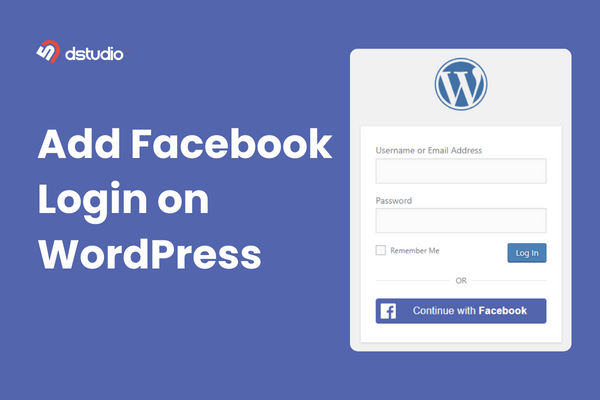Outsourcing has become a major trend in the fast-changing web development Industry. As businesses aim to stay ahead in the highly competitive online marketplace, they are seeking affordable and effective solutions.
In recent times, there has been a significant change in how businesses approach web development. With the rise of cloud technology, remote workers, and advanced tools for collaboration, outsourcing has become not only a viable option but also a crucial strategy.
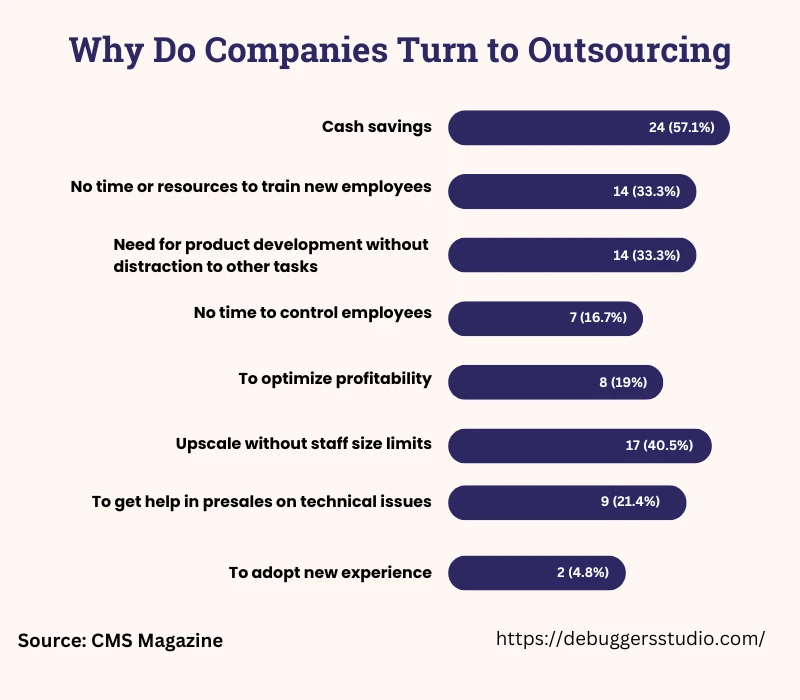
Based on predictions from industry experts, the outsourcing industry is expected to experience significant expansion. It is projected to grow at an average rate of 4% each year from 2021 to 2025.
Furthermore, Straits Research anticipates even more substantial growth for IT outsourcing, with an estimated yearly rate of 9.3% from 2023 to 2031. By that time, the market is predicted to soar to an astounding $1416.3 billion.
What does this mean for you? Well, it means that businesses now have a great chance to utilize a global pool of talented developers to advance their WordPress projects.
Whether you’re a small startup or a large Fortune 500 company, outsourcing can provide a way to expand, improve efficiency, and foster innovation.
However, within the potential benefits of outsourcing, there are lot of questions and factors to consider including :
-How can you locate the appropriate white label contractor for your WordPress project?
-What are the possible issues to avoid?
-And, most importantly, how can you make the most of the economic advantages of outsourcing while still ensuring high quality and dependability?
In this guide, we will directly tackle these questions, also offer you practical advice and effective strategies to confidently navigate the world of outsourcing.
Why Outsource in the First Place?
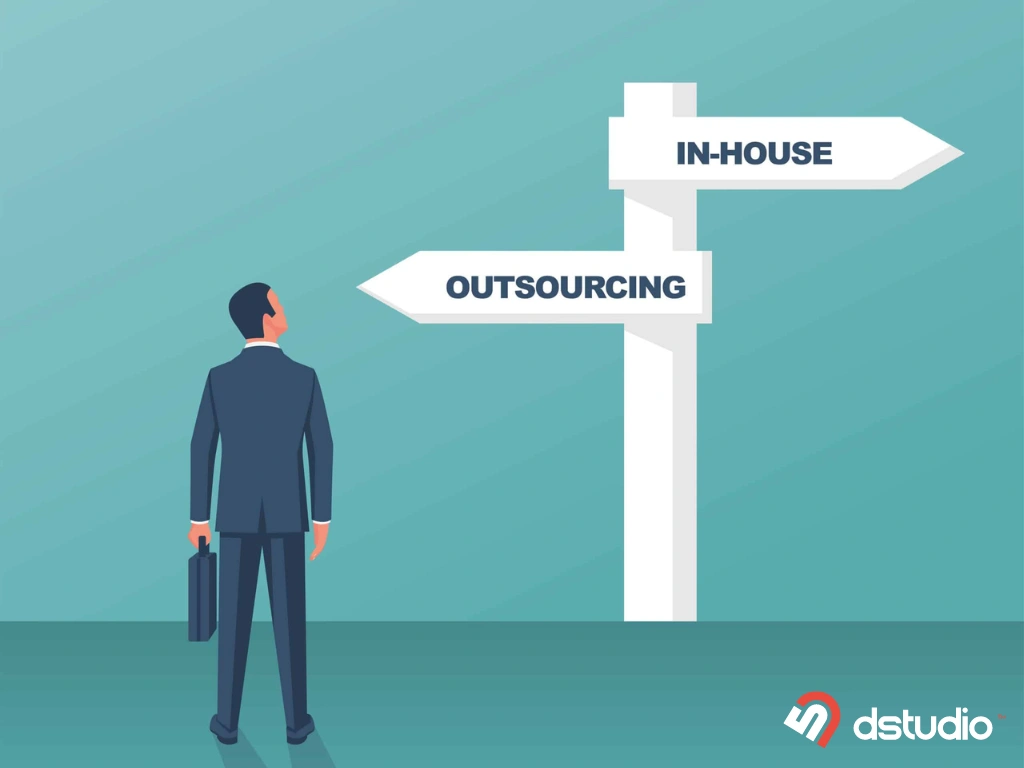
As the owner of a web agency, you have many tasks to handle. In addition to the day-to-day operations, you also need to make plans, overcome challenges, and find scopes to make more profits.
But you don’t have to do everything by yourself. It’s likely that you have already hired In-house employees to assist with the more time consuming tasks. But if you’re considering bringing in new talents, there are even more affordable options than hiring in-house employees.
In addition to hiring full-time or part-time in-house employees, you can also outsource your work with freelancers or organizations to handle important tasks for your business.
Outsourcing is a common practice for tasks like accounting, customer support, and social media marketing. Many organizations go a step beyond and hire agencies to handle their cloud-based IT systems and network infrastructure. But, what about the aspect of web development?
Why Start Outsourcing WordPress Web Development Projects?
There are a few important signs that can indicate when your agency is ready to outsource your WordPress web development projects :
⦾ Your agency is expanding and requires more skilled professionals.
⦾ If your agency focuses on marketing, consultancy, or graphic design, and you regularly need WordPress web development support.
⦾ A client’s request might involve features that exceed your team’s capabilities or are too labor-intensive to handle internally.
⦾ You have lot of projects and need to delegate some tasks to a reliable third-party.
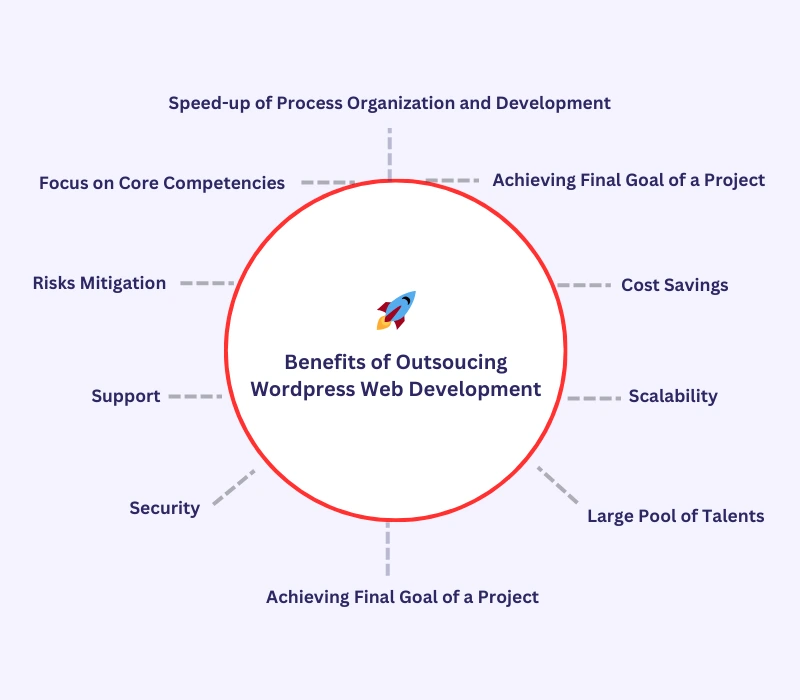
What About Hiring In-house Developers?
Building an in-house development team offers long-term advantages. Your developers gain a deep understanding of your company’s needs, communication becomes effortless, and you maintain complete control over project quality.
However, the investment is significant. Salaries, benefits, and health insurance can quickly eat into your budget, particularly when hiring senior developers.
Another challenge to consider is managing human resources. It can be difficult to find the right employees and this process takes time. Also, there is a possibility that they might leave for better job opportunities, which means you would have to start the hiring and training process all over again for a new developer.
Building an in-house development team isn’t for everyone. It’s a big commitment that requires careful consideration. Here’s why:
⦾ Cost vs. Workload: You must have confidence that the extra work you take on will be worth the additional money and resources needed to support an in-house team.
⦾ Team Management: Effectively managing a development team requires strong leadership and HR skills. Are you prepared to handle recruitment, training, and potential performance issues?
⦾ Employee Retention: In-house development thrives on long-term commitment. Can you create an environment that keeps your developers engaged and motivated to stay with the company?
If you’re unsure about these factors, or only need occasional high-quality development work, outsourcing might be a better fit for you.
Working With an Outsource Web Development Company
As your agency grows, outsourcing web development becomes an attractive option for fast, reliable access to top talent.
Maybe your project flow is seasonal, meaning you have busy periods with lots of projects for a particular time of the year, and the rest of the months are quieter with fewer projects. In that scenario hiring a full-time team wouldn’t make sense.
Outsourcing shines when you have too many projects for your agency, but not enough to hiring full in-house team. Here’s why it’s so appealing:
⦾ Cost-effective: Outsourcing web development is typically cheaper than in-house salaries.
⦾ Scalability: You can outsource projects on a case-by-case basis. There’s always an agency ready to take on additional work, which ensures a constant talent pool when you need it.
Outsourcing gives you access to a company’s entire team. Web development goes beyond just coding – you need designers, marketers, and skilled coders working together. Outsourcing lets you tap into this combined expertise exactly when you need it.
How to find the Perfect Outsourcing Partner for Your WordPress Web Design Project
Follow the instructions below to find the ideal outsourcing partner for your WordPress web design Project:
Finding the Right Fit: Methodology Matters
The world of web development revolves around different methodologies.
⦾ Waterfall method is a traditional project management approach known for its structured, step-by-step process. In waterfall method – each step (requirements, design, development, testing, etc.) must be completed entirely before moving on to the next. This ensures clear planning and documentation.
⦾ Agile, on the other hand, is a approach that breaks down large projects into smaller, manageable phases. Teams work in short sprints, focusing on specific tasks and receiving continuous feedback to adapt and improve throughout the project.
You need to Understand these two popular methodologies and choose the one that aligns with your project and preferences for a smooth development process.
Communication is Key: Bridging the Gap
Don’t underestimate the power of clear communication. While outsourcing can offer great rates, consider time zones and cultural differences.
A developer located halfway across the globe might present a tempting price tag, but a 10-hour time difference and potential language barriers can cause problems down the line. Before outsourcing, weigh these factors to ensure a smooth project.
White Labeling Your Web Services
It’s tough for web agencies to meet deadlines and satisfy clients at the same time. It often feels like trying to balance on a tightrope. Especially when unexpected changes or the need for certain skills come up, it can mess up the team’s workflow.
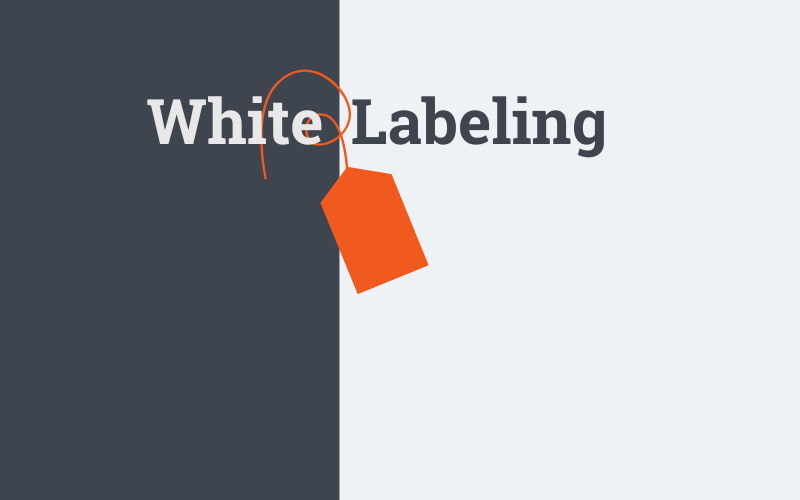
To navigate this challenges, many agencies choose to outsource their work. There are multiple ways to effectively outsource work while keeping costs low. One of the top choices for expanding web agencies is through white labeling.
What is White Labeling?
White labeling is a business practice where one company makes a product, but another company puts its own brand on it and sells it as if they made it.
Example in Web Development
Imagine a small web agency that specializes in digital marketing but does not have the in-house capability to develop complex WordPress websites. They can hire a white label web development firm to create the websites for their clients.
The white label firm completes the development work, and the web agency brands the final product with their own logo and delivers it to the client. The client only sees the web agency’s branding, not the white label firm’s.
Why Do Agencies Use White Labeling?
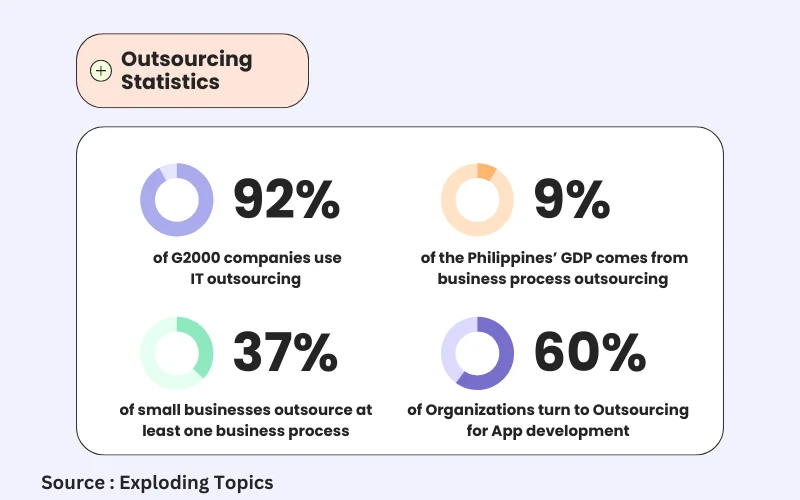
White labeling provides a solution for handling important clients who require services beyond your current capabilities.
Imagine you run a marketing agency, crushing it at social media campaigns. But a client asks for a WordPress website – something you don’t specialize in. Here’s where white labeling comes in!
White labeling lets you partner with a web development company. They build the website, but you brand it with your agency’s logo and handle the client.
This is a win-win: you keep your client happy with a full suite of services, and you save money and time by not building a whole web dev team. Plus, you can attract bigger clients who need more than just marketing services.
Pros and Cons of White Labeling
You need to be careful when choosing a white label partner because your brand’s reputation depends on their ability to meet your expectations.
Cons of White Labeling :
⦾ You rely on the partner’s quality and timelines, which can be difficult to manage.
⦾ Misunderstandings and delays can occur, especially with remote partners.
⦾ The work provided may not always match your standards or style.
⦾ If the partner faces issues, it can impact your project delivery and reputation.
⦾ Sharing project details with external parties can pose risks to confidentiality and intellectual property security.
Pros of White Labeling :
⦾ Save on the expenses of hiring and maintaining a full-time in-house team.
⦾ Tap into specialized skills and knowledge that your in-house team may lack.
⦾ Easily scale your services up or down based on client demand without long-term commitments.
⦾ Free up your internal resources to concentrate on core business activities and strategy.
⦾ Benefit from faster project completion times due to the expertise and efficiency of the white label partner.
What to Look for in a White Label Partner?
Now that you understand the pros and cons of white labeling, choosing the right partner is crucial. Here’s what to look for:
⦾ Revision-Friendly: Find a white label partner who offers free revisions. Remember, it’s your client’s project, so you want flexibility to ensure it meets their exact needs. Don’t get stuck with a half-finished product and a provider unwilling to make changes.
⦾ Proven Track Record: Research your partner’s reputation. Check out what other agencies say about them. Do they consistently deliver projects on time and within budget? A strong track record is a good indicator of future success.
⦾ Always Available: Responsiveness is key. The best white label partner isn’t always the cheapest or most skilled – it’s the one who answers your calls and emails promptly and professionally. Consistent communication is crucial for a smooth workflow.
⦾ Clear Contract Terms: Before jumping in, define the white labeling agreement clearly in a contract. This ensures both your needs and your partner’s needs are addressed. Think of it like a roadmap for a successful collaboration.
What to Look for When Outsourcing WordPress Web Projects
When you decide to outsource your WordPress web projects, several important questions may arise:
-Who should you hire?
-What factors should you consider when making a decision?
-Which agency provides the best quality work at a great value?
Many online marketing companies outsource their web development, but not all achieve success. Our straightforward guide will help you understand why this happens and how to make the best choice for your own company. Continue reading to learn more!
Pros to Outsourcing WordPress Web Projects
To understand why agencies are turning to third-party developers more often, let’s explore the advantages of outsourcing web projects:
⦾ High-Quality Development: Outsourcing allows you to hire skilled WordPress developers who specialize in creating high-quality websites. These experts have a lot of experience and knowledge, so you can be sure that your project will be done really well.
⦾ Advanced Customization: Experienced WordPress developers can provide advanced customization and functionality tailored to your specific needs, which might be challenging to achieve with an in-house team with a more general skill set.
⦾ Lower Operational Costs: By outsourcing, you can significantly reduce operational costs such as salaries, benefits, and office space. You pay only for the work done, avoiding the long-term financial commitment associated with full-time employees.
⦾ Competitive Pricing: Many outsourcing firms operate in regions with lower labor costs, allowing you to get high-quality work at a fraction of the price you would pay for local talent.
⦾ On-Demand Talent: Outsourcing provides the flexibility to scale your team up or down based on project requirements. This means you can quickly adapt to changing project scopes without the delays and costs associated with hiring or laying off staff.
⦾ Faster Turnaround Times: With a dedicated team of professionals working on your project, you can usually get things done faster. This helps you meet deadlines and launch your projects more quickly.
⦾ Free Up Internal Resources: Outsourcing allows your in-house team to focus on core business activities such as strategy, marketing, and client relationships.
⦾ Delegate Non-Core Tasks: By outsourcing web development, you can have experts take care of tasks that aren’t the main focus of your business. They can do these tasks efficiently while you focus on what you’re best at.
⦾ Up-to-Date Skills: Outsourcing firms often invest in the latest tools and technologies to stay competitive. By partnering with such firms, you benefit from their up-to-date skills.
⦾ Innovative Solutions: With access to a broad range of expertise and technology, outsourcing partners can offer innovative solutions that might not be available in-house.
⦾ Shared Responsibility: When you outsource, the responsibility for delivering the project is shared with the outsourcing partner. This can help mitigate risks related to project management and delivery.
⦾ Professional Oversight: Outsourcing firms typically have established processes for quality control and assurance. This means your project undergoes rigorous testing and review to ensure it meets high standards.
In addition to these advantages, outsourcing also has some disadvantages. Therefore, it is important to choose the proper agency in order to minimize the potential risks.
Cons to Outsourcing WordPress Web Projects
Here are some common issues that many agencies encounter when they choose to outsource their WordPress projects:
⦾ Time Zone Differences: Working with teams in different time zones can lead to communication delays and make real-time collaboration difficult.
⦾ Language Barriers: Language differences can result in misunderstandings and miscommunications, affecting the quality and efficiency of the project.
⦾ Inconsistent Standards: The quality of work can vary significantly between different outsourcing providers, making it hard to ensure consistent standards.
⦾ Less Direct Oversight: With an outsourced team, you have less direct control over the development process, which can impact the final outcome.
⦾ Data Privacy: Sharing sensitive information and access credentials with an external team can pose security risks.
⦾ Intellectual Property: Protecting intellectual property rights can be more challenging when working with third-party contractors.
⦾ Reliability: Your project’s success heavily depends on the reliability and performance of the outsourcing partner, which can be risky if they do not meet deadlines or quality expectations.
⦾ Lack of Control: Relying on an external team can limit your control over the project’s progress and timeline.
⦾ Unexpected Expenses: While outsourcing can be cost-effective, there can be hidden costs such as additional revisions, communication overhead, and project management fees.
⦾ Contractual Obligations: Long-term contracts with outsourcing firms can sometimes lock you into agreements that may not be beneficial as your business needs change.
⦾ Work Culture: Differences in work culture and practices can lead to friction and inefficiencies.
⦾ Client Expectations: Misalignment in client expectations and the outsourcing team’s work approach can result in dissatisfaction with the final product.
⦾ Multiple Clients: Outsourcing agencies often juggle multiple clients simultaneously, which can lead to divided attention and lower commitment to your project.
⦾ Short-Term Focus: Outsourced teams may prioritize quick delivery over long-term quality and sustainability of the project.
⦾ Technical Compatibility: Integrating the outsourced project with your existing systems and workflows can be complex and time-consuming.
⦾ Collaboration Tools: Differences in the use of collaboration tools and platforms can create friction and slow down progress.
⦾ Team Changes: High turnover rates within outsourcing agencies can disrupt your project and lead to inconsistencies in the work.
But you can mitigate these cons and maximize the benefits of outsourcing your WordPress project with careful selection of outsourcing partner and detailed project management.
Things to Verify When Outsourcing Your WordPress Project
Before you choose an agency to outsource your WordPress project you should verify their :
⦾ Track record of previous collaboration with agencies like yours
⦾ Competence
⦾ Work experience
⦾ Reviews
⦾ Hourly Rates
⦾ Customer service quality
⦾ Revision/Modification policy
⦾ Location (are they US-based?)
How to Find a WordPress Web Development Contractor
Choosing the right web development contractor is extremely important when you decide to outsource. Almost half of the companies that outsource their web development have concerns about the quality of work they receive.
Plan Ahead to Ensure Success
Before reaching out to potential partners, develop a detailed outsourcing plan. Consider these questions before starting your search for partners and web agencies:
⦾ What is Your Budget?
It is important to have a good understanding of your budget when outsourcing web development. The main objective is to make sure that the arrangement improves your profitability.
You need to be aware of your company’s financial limits for paying for outsourced services. It is also a good idea to have multiple budget levels so that you have a backup plan if your first choice of contractor does not meet your expectations.
This way, you can be flexible and make sure that you stay within your financial means.
⦾ How Much Experience Do You Need?
Decide how skilled the developers need to be for your project. If your project has complicated features or requires advanced customization, you’ll need WordPress developers who have a lot of experience.
Look at the contractor’s previous projects to make sure they have successfully worked on similar ones before.
⦾ How Many Developer Do you Need ?
Determine how many developers you will need for your project based on its size and complexity. Smaller projects may only need one or two developers, while larger and more complicated projects might require a whole team.
Take into account the time frame and amount of work involved to decide on the best team size.
⦾ How Long Do Your Project Typically Last?
Understand the typical duration of your projects to align with your outsourcing plans.
Whether your projects are short or long, make sure the contractor is able to work for the whole duration and can meet deadlines. This will help you plan and manage project timelines well.
These questions show the importance of not rushing the hiring process. Agencies that find partners early can better meet customer expectations.
If high-volume work surprises you, stay calm. Understand your needs and prioritize hiring a reliable contractor, even if they cost more. This ensures quality results while you look for a more affordable partner for future projects.
Where Can I Find a Web Development Contractor?
We have listed four popular options below to help you with this process.
1. Online Freelance Marketplace:
Online freelance marketplaces are great places to find web development contractors. You can use platforms like Upwork, Freelancer, and Fiverr to find a wide range of developers from around the world.
Here’s how it works:
- Browse Profiles: You can browse through profiles of freelance developers, view their portfolios, and read reviews from previous clients.
- Post Your Project: Describe your project in detail, and interested freelancers will bid on it, then you can compare those offers to find the best fit for your needs.
- Direct Contact: You can directly contact with freelancers to discuss your project and ask questions to see if they understand your requirements.
- Payment Security: These platforms provide secure payment methods, where funds are released only when you’re satisfied with the work.
Benefits:
- Wide Selection: Access to a global pool of talent.
- Flexibility: Hire freelancers for short-term or long-term projects.
- Competitive Rates: You can find developers at various price points to fit your budget.
Considerations:
- Quality Variability: The quality of work can vary, so carefully review profiles and feedback.
2. Online Local Classifieds:
Another option to find a web development contractor is through online local classifieds. Websites like Craigslist or local Facebook groups can connect you with developers in your area.
Here’s how it works:
- Search Listings: You can browse the web development or services section for listings posted by local developers.
- Post Your Ad: You can also post an ad with your project detail and invite local developers to contact you.
- Direct Communication: You can meet your contractors in person to discuss your project and negotiate terms.
Benefits:
- Local Talent: Working with local developers can make communication easier and allow for face-to-face meetings.
- Community Connections: You might find contractors who are familiar with your local market and business environment.
3. Managed Listing Services:
Managed listing services like Clutch, UpCity, and DesignRush create lists of web development agencies and freelancers, that offers more vetted approach to find right contractor.
Here’s how it works:
- Browse Listings: These platforms provide detailed profiles of web development agencies and freelancers, including their services, portfolios, and client reviews.
- Filter and Compare: You can use filters to narrow down options based on your project needs, budget, and other criteria. You can also compare multiple contractors side by side.
- Contact Directly: Once you find potential candidates, you can contact them directly through the platform to discuss your project.
Benefits:
- Vetted Professionals: Contractors listed on these sites are often vetted and reviewed, that ensures a higher level of quality and reliability.
- Detailed Information: You can view the profiles of contractors, which will provide you with information about their past work and feedback from previous clients. This will help you make informed decisions.
Considerations:
- Higher Costs: Managed listing services usually feature more established agencies and professionals, which can come at a higher cost.
4. References and Networking:
If you want to find reliable connections, talking to contractors you’ve worked with before is a great idea. Even if they don’t have the specific skills you’re looking for, they might know someone who does. These contractors often have a large network of people they work with in similar fields.
If you’re new to this, attending local meetups and developer conferences is a great way to start building your network.
TIp : No matter which method you choose, start monitoring team performance from the beginning. If you notice any issues early on, don’t hesitate to end the partnership—it’s easier to address problems sooner rather than later.
Why Partner with a US-Based Outsourcing Agency
The global tech industry is shifting, with more IT jobs moving overseas due to lower costs and easy scalability. While this seems beneficial for businesses, there are some significant disadvantages to consider.
Here’s the issue: When you try to cut costs, you often have to sacrifice quality. Overseas companies that have cheap labor might not be able to meet your high standards. On the other hand, hiring US-based agencies can be really expensive.
This leaves many small businesses and web agencies in a difficult situation. They have to choose between two imperfect options:
⦾ Lower Costs, Lower Expectations: They can hire a cheap overseas company, but they’ll probably have problems with the quality of their work. This could lead to unhappy customers and damage their reputation.
⦾ Premium US Partner, Risky ROI: They can spend a lot of money on a top-tier US outsourcing partner, but there’s a risk that they won’t make enough money to cover the cost. They might also lose clients if they have to raise their prices.
Neither option is good for business growth. Depending only on a good reputation won’t be enough if customers have bad experiences, and high prices can scare away potential clients and make it hard to make a profit.
In the next section, we’ll look at a solution that combines onshore and offshore outsourcing. This could be a great option for businesses of any size.
Choose a US-Based Outsourcing Agency with an Offshore Workforce
When you hire a US-based outsourcing agency that employs offshore workers to perform tasks, you get the advantages from both sides.
This way, you get:
US Expertise: A US team oversees the project, to ensure clear communication and quality control.
Global Efficiency: You will also benefit from the affordable rates of offshore developers.
It’s a win-win! You avoid the communication headaches of working directly overseas, while still enjoying cost advantages.
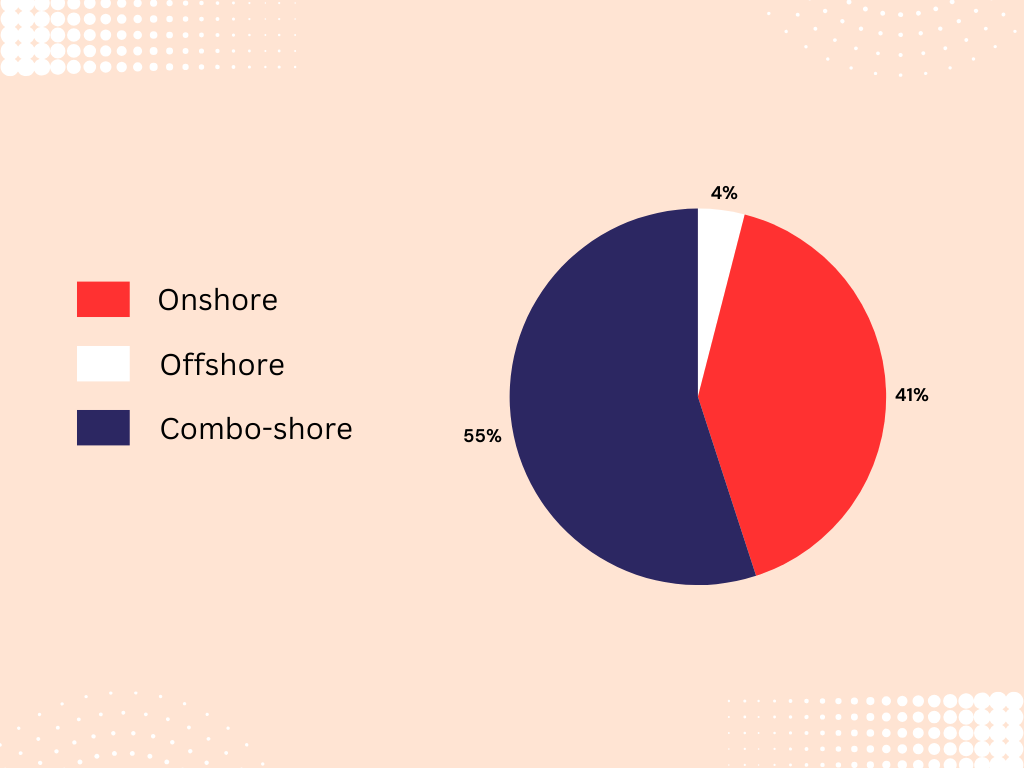
Below I will explain some of the most important benefits of outsourcing to combo-shore :
1. No Time Zone Issues: A US-based team manages the project during your working hours, which helps to eliminate communication delays and frustrations caused by significant time zone differences.
2. Management Understands Your Business, Your Customers: A US-based management team has a better understanding of your business environment and customer expectations. This familiarity helps to align the project outcomes with your business goals and customer needs.
3. No Cultural Gap: Cultural differences can often lead to misunderstandings and inefficiencies. By having a US team manage the offshore workers, you minimize cultural gaps and ensure smoother collaboration.
4. Legal Accountability: Working with a US-based agency provides a layer of legal accountability that can be reassuring. US companies are subject to US laws, which means you can feel more confident that contracts will be enforced and your data will be kept secure.
5. Superior Quality: US agencies typically have stringent quality control measures in place. By using their expertise and supervision, you can expect high-quality work from the offshore team.
6. No Compromises: With a combo-shore approach, you don’t have to compromise on quality or cost. You get the best of both worlds—high standards of quality from the US team and cost-effective solutions from offshore developers.
7. Focus on Growth: When you outsource routine and time-consuming tasks, your internal team can focus on strategic initiatives and growth opportunities. This approach helps you to scale your business more effectively.
8. Complete Flexibility: Combo-shore outsourcing offers flexibility in scaling your resources up or down based on project needs. This adaptability helps you manage costs and resources more efficiently.
How Much Does WordPress Web Project Outsourcing Cost?
The price of outsourcing a WordPress web project can change a lot depending on where the service providers are located and how complex the project is. Let me explain the typical costs in different locations: onshore, offshore, and combo-shore.
Onshore Outsourcing (US-based)
Onshore outsourcing involves hiring developers within the same country. In the United States, the costs are generally higher due to the higher cost of living and wages.
- Hourly Rates: $75 – $150 per hour
- Project-Based Costs:
- Small Projects (simple websites, minor customizations): $3,000 – $10,000
- Medium Projects (custom themes, multiple functionalities): $10,000 – $30,000
- Large Projects (complex integrations, custom plugins, e-commerce): $30,000 – $100,000+
Offshore Outsourcing
Offshore outsourcing involves hiring developers from countries with lower labor costs. Popular offshore destinations include India, Eastern Europe, and Southeast Asia.
- Hourly Rates: $15 – $50 per hour
- Project-Based Costs:
- Small Projects: $1,000 – $5,000
- Medium Projects: $5,000 – $15,000
- Large Projects: $15,000 – $50,000+
Combo-Shore Outsourcing
Combo-shore outsourcing combines the benefits of onshore and offshore models. Typically, a US-based project management team works with offshore developers.
- Hourly Rates: Blended rates, generally $40 – $100 per hour
- Project-Based Costs:
- Small Projects: $2,000 – $8,000
- Medium Projects: $8,000 – $25,000
- Large Projects: $25,000 – $75,000+
Cost Estimation Factors
When estimating the cost of a WordPress web project, consider the following factors:
⦾ Project Scope and Complexity:
Basic Websites: Simple informational sites with minimal customization.
Medium Complexity: Custom themes, additional functionalities, and moderate customization.
High Complexity: E-commerce, custom plugins, integrations with third-party systems, and advanced functionalities.
⦾ Design Requirements:
Standard Templates: Using pre-made themes with minor customizations.
Custom Design: Unique, custom-made designs requiring more development effort.
⦾ Functionalities and Features:
Basic Features: Contact forms, standard navigation, basic content management.
Advanced Features: E-commerce capabilities, membership systems, custom post types, interactive elements.
⦾ Content Creation and Management:
Content Creation: Costs for writing, editing, and multimedia production.
Content Migration: Moving existing content from another platform to WordPress.
⦾ SEO and Performance Optimization:
Basic SEO: Basic on-page SEO and performance optimization.
Advanced SEO: Comprehensive SEO strategies, performance enhancements, and analytics setup.
⦾ Maintenance and Support:
Ongoing Maintenance: Regular updates, backups, and security checks.
Support Services: Technical support, troubleshooting, and training for content managers.
Conclusion
Congratulations! You’ve reached the end of our ultimate guide to outsourcing WordPress website projects. Now you’re equipped with the knowledge and resources to make informed decisions about your agency’s workflow.
Remember, outsourcing can be a powerful tool to free up your time, access top talent, and scale your business. By following the tips and strategies outlined here, you can build a successful partnership with an outsourcing provider and deliver exceptional results for your clients. So, what are you waiting for? Start exploring the possibilities and unlock the full potential of outsourcing for your agency’s WordPress projects!





